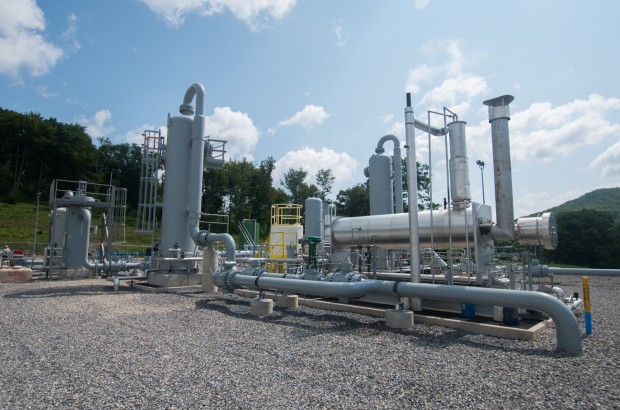In climate move, Wolf unveils new methane regulations for oil and gas industry
-
Marie Cusick

Joe Ulrich / WITF
State environmental regulators will develop new regulations aimed at curbing methane leaks from new and existing oil and gas infrastructure, like this gas processing equipment in Lycoming County.
Governor Tom Wolf announced new plans Tuesday to cut methane emissions from the state’s oil and gas sector. Methane is a powerful greenhouse gas that contributes to climate change. Wolf’s announcement follows a similar move by the U.S. Environmental Protection Agency in September.
“These are commonsense steps that Pennsylvania can take to protect our air and reduce waste for industry,” Wolf said in a statement. “The best companies understand the business case for reducing methane leaks, as what doesn’t leak into the atmosphere can be used for energy production.”
The rules will create a new permit for oil and gas companies requiring them to use the best available technologies to prevent leaks at well sites and compressor stations. The state Department of Environmental Protection also plans to develop new regulations to curb leaks at existing oil and gas infrastructure.
Methane is the main component of natural gas. Compared to carbon dioxide, it is a much more potent greenhouse gas, although it stays in the planet’s atmosphere for a shorter time period. On a 100-year time scale methane is more than 25 times more powerful than CO2, according to the EPA.
From a climate perspective, natural gas has become an attractive fossil fuel alternative for electric power generation. When burned, natural gas emits about half the carbon pollution compared to coal, which remains the nation’s largest source of electricity. However scientists have warned that the methane leaks caused by drilling, transporting, and processing gas could undermine its climate benefits. Recent research has focused on finding the “super-emitters”— places where leaks are significant.
According to the DEP, Pennsylvania’s Marcellus Shale industry reported nearly 115,000 tons of methane emissions in 2014. The agency considers that a low estimate, since fugitive emissions are difficult to quantify.
The new rules will have four parts. From the announcement:
- To reduce leaks at new unconventional natural gas well pads, DEP will develop a new general permit for oil and gas exploration, development, and production facilities, requiring Best Available Technology (BAT) for equipment and processes, better record-keeping, and quarterly monitoring inspections.
- To reduce leaks at new compressor stations and processing facilities, DEP will revise its current general permit, updating best-available technology requirements and applying more stringent leak detection and repair (LDAR), other requirements to minimize leaks. A new condition will require the use of Tier 4 diesel engines that reduce emissions of particulate matter and nitrous oxide by about 90%.
- To reduce leaks at existing oil and natural gas facilities, DEP will develop a regulation for existing sources for consideration by the Environmental Quality Board.
- To reduce emissions along production, gathering, transmission and distribution lines, DEP will establish best management practices, including leak detection and repair programs.
The DEP will hold a webinar on the methane rules Wednesday at 11:30am.
Environmental groups applauded the move.
“Gov. Wolf’s bold leadership takes an important and much needed step toward protecting the health of Pennsylvania citizens from drillers’ harmful methane pollution,” says PennFuture CEO Larry Schweiger. “This industry is recklessly wasting natural resources and appears to care little about the health of its neighbors or the rapidly warming planet.”
The Marcellus Shale Coalition, a trade group representing Pennsylvania’s gas industry, says it’s committed to working with the Wolf administration and legislators on the issue.
“It cannot be overstated that shale-related methane emissions continue to steeply drop as production sharply climbs,” says MSC President Dave Spigelmyer. “These positive results are a function of the industry’s widespread use of operational best practices and continuous investments aimed at protecting and enhancing our environment greenhouse gas.”
















